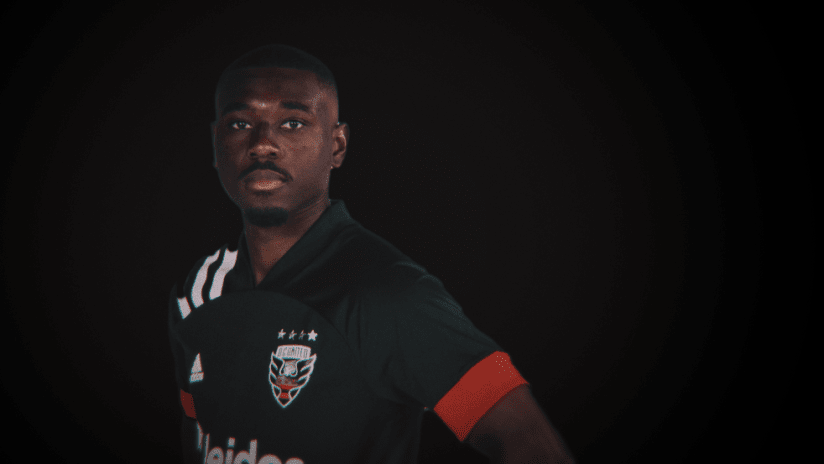WASHINGTON – A year and a half ago, Chris Odoi-Atsemfought off Hodgkin's Lymphoma, powered by a dogged will, the support of his family and several months of chemotherapy.
So as thousands prepared to congregate in the United States’ capital city Saturday for its biggest day yet of protests and marches in the wake of George Floyd’s killing last month, D.C. United’s hometown fullback had good reason to second-guess his desire to take part.
“At first I was a little apprehensive about going with the [COVID-19] pandemic going on,” Odoi-Atsem, 25, told MLSsoccer.com on Monday. “My history of cancer makes me a little more susceptible to the virus. But I thought the message and being out there outweighed that for sure for me. And so I definitely wanted to be there.”
So after United’s training session at Audi Field, he and teammate Bill Hamid donned face coverings and hit the streets along with many others from across the D.C. area and points far beyond, marching in support of the Black Lives Matter movement and demanding justice for Floyd and the many other victims of systemic racism. And he won’t soon forget the experience.
“It was definitely a powerful moment,” he said. “I'm so glad I did go and was a part of that. Going out there, it was just really beautiful to see all the different people of all different backgrounds and races and genders and age groups.”
Earlier in the day, Odoi-Atsem and Hamid fielded an unusual phone call as they prepared to head downtown. It was Jason Levien, D.C. United’s co-chairman and CEO, explaining he and the rest of the club’s leadership hoped to make a gesture of support for the same groups and ideals the duo were about to march for, and seeking their feedback.
One day later, members of the Black-and-Red community worked together to paint the phrase “I can’t breathe” and the acronym “BLM” in bold red letters on the pitch at Audi Field, a striking and timely statement that caught in stride the spirit of the national moment.
“I don’t think any sports team, in any sports league, in any part of the world has done something as unique as this,” said Odoi-Atsem. “So it definitely meant a lot to me. Just being there and hearing about how the staff spent a lot of time on that Saturday prepping for it and mapping out how they want to happen on Sunday, I really appreciate that too. This is a kind of a microcosm of the bigger picture. On a larger scale, it’s going to take everyone coming together to make something happen, to make this real change, and everyone was there on Sunday doing this thing: the team, the coaches, the owner, the staff, supporter groups.”
Like many others who bear the brunt of America’s long, painful relationship with race, Odoi-Atsem – whose father’s side of the family hails from Ghana – admits he’s generally “pessimistic” about the prospects of true societal progress on the matter. He also carries his own firsthand experiences, having been arbitrarily targeted by law enforcement on several occasions while growing up in D.C.’s Maryland suburbs.
“You’ve just seen it so many times before, right? A Black man or woman getting killed by a police officer, there's a little bit of action, but then eventually things die down and no real change happens,” he noted. “There are doubts in most people I’ve talked to. And that's just the reality of what we know from the past.”
But the visceral, sweeping response to Floyd’s brutal murder, and concrete manifestations of it like Saturday’s protests, have renewed Odoi-Atsem’s hope this case could be a turning point, a chance to launch a truly broad-based, impactful movement.
“When I was out there, I could really just feel serious change will come from this,” he said. “It just really does feel different. It’s sad to see that a man had to lose his life like that for these things to take place. But it’s beautiful that everybody's fighting for justice and fighting for change and that people are really coming together.
“As Black people, we’ve been dealing with these type of systemic injustices for hundreds of years. And we really need help right now, and I think people really are starting to realize that, and really, genuinely want to help make a change. Personally, I think that's what's needed: more people with real influence, privilege and power stepping in and helping.”
The next step: Turning statements of support into tangible action.
“It can’t just be statements from everyone who's coming out stating their support, or they want change as well,” said Odoi-Atsem. “It's great that you say that and we definitely do appreciate that, but there has to be action behind your words as well. And that's something I’ve been reflecting on, too.
“How can we as the organization bounce ideas off each other, from the owner, coaches, players, staff, fans, to help fight different things in our community that we want to change? And I think it can happen. We can do a lot of good things being a professional sports team.”













